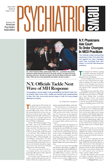The psychological fallout from the World Trade Center attacks will undoubtedly stretch New York City’s mental health system. Steps to deal with the increased demand for services were outlined last month by Neal Cohen, M.D., health and mental health commissioner of New York City, at a meeting organized by the Greater New York Hospital Association (GNYHA) in Manhattan.
Former APA President Joseph T. English, M.D., chair of the GNYHA mental health and substance abuse service committee and chair of the department of psychiatry at St. Vincent’s Hospital in New York City, introduced the people who spoke at the meeting. They included Cohen; James Stone, commissioner of the New York State Office of Mental Health; and several deputy commissioners. The meeting was designed to inform psychiatrists and mental health professionals from numerous area hospitals and private organizations about state and local mental health efforts and to solicit their input.
“The trauma associated with the terrorist attacks and fear of recurrence have profoundly affected New York’s eight million residents,” said Cohen.
To meet their mental health needs will require a public health approach and continued collaboration among federal, state, and local mental health officials, said Cohen.
“Our first priorities are serving the survivors, many of whom have been injured; families of the deceased, estimated to be at 5,400; and the rescue workers, who lost at least 350 of their peers in the immediate aftermath,” said Cohen. He added that numerous children and adolescents witnessed the horror from their schools and had to be evacuated. Many of them may be traumatized.
He announced that the Department of Mental Health, Mental Retardation, and Alcoholism Services (DMH) will continue to staff the city’s Emergency Operations Center at Pier 92 and the Family Assistance Center at Pier 94 indefinitely. The first death certificates were handed out earlier this month at the center to families to expedite obtaining life insurance and other benefits, said Cohen. New York Mayor Rudolf Giuliani had requested that this be done.
Cohen also announced that the DMH and volunteers will continue to staff the 24-hour mental health hotline (LIFENET) for crisis counseling, information, and referrals. DMH will also continue to staff “rest and recovery” stations at ground zero to provide mental health and support services for the recovery workers. Giuliani has predicted that it will take at least a year to sift through the tons of remaining rubble at the World Trade Center. Cohen also mentioned that the department will be meeting with the state Board of Education and relevant federal and state agencies on strategies to help children cope with and heal from this traumatic event.
Elizabeth Nelson, chief of the Emergency Services and Disaster Relief Branch at the federal Center for Mental Health Services, announced at the GNYHA meeting in September that the state had been awarded a $22.7 million grant for crisis-counseling assistance and training. Nelson has been helping New York mental health officials apply for federal grants including this one, which was funded by the Federal Emergency Management Agency.
Cohen told Psychiatric News that the city has received $14 million, and seven surrounding counties in New York have received the remaining $8.7 million.
A large percentage of the funds will be used to launch a citywide training program for mental health professionals and paraprofessionals. The training will include crisis counseling and interventions, recognizing normal and abnormal reactions to trauma, understanding recovery, and knowing when to refer.
“We owe it to New Yorkers to ensure that they get state-of-the-art help,” said Cohen.
The first training workshops were held this month for mental health professionals employed in licensed clinics in Manhattan and Staten Island. “We picked these clinics because they are located in communities that have been greatly affected by the disaster,” according to Patricia Harrison, Ph.D., the DMH assistant commissioner who is coordinating the training response.
Harrison told Psychiatric News that the training sessions will be open to mental health professionals and paraprofessionals employed in licensed clinics. “Right now we are focused on crisis counseling, but the long-term focus will be on recovery, public education, and outreach,” said Harrison.
Cohen said that the greatest challenge will be reaching the large number of people “who most likely will never come through our mental health doors. We will need to go where they work, live, worship, and play. If people feel comfortable with our messages about mental health, they will be more likely to seek professional help when needed,” said Cohen.
He remarked that the tragedy has presented a unique opportunity for the mental health system. “We know that as providers we have been marginalized and our clients stigmatized. People realize for the first time that mental health care is needed to recover and heal. If we do this right and help the city recover, we can advance our community and become an important part of public health and the life of the city,” said Cohen.
Information about the DMH disaster response is available on its Web site at www.nyc.gov/html/dmh/html/public/dmh911.html. Information about GNYHA crisis mental health services is available on its Web site at www.gnyha.org;. ▪
